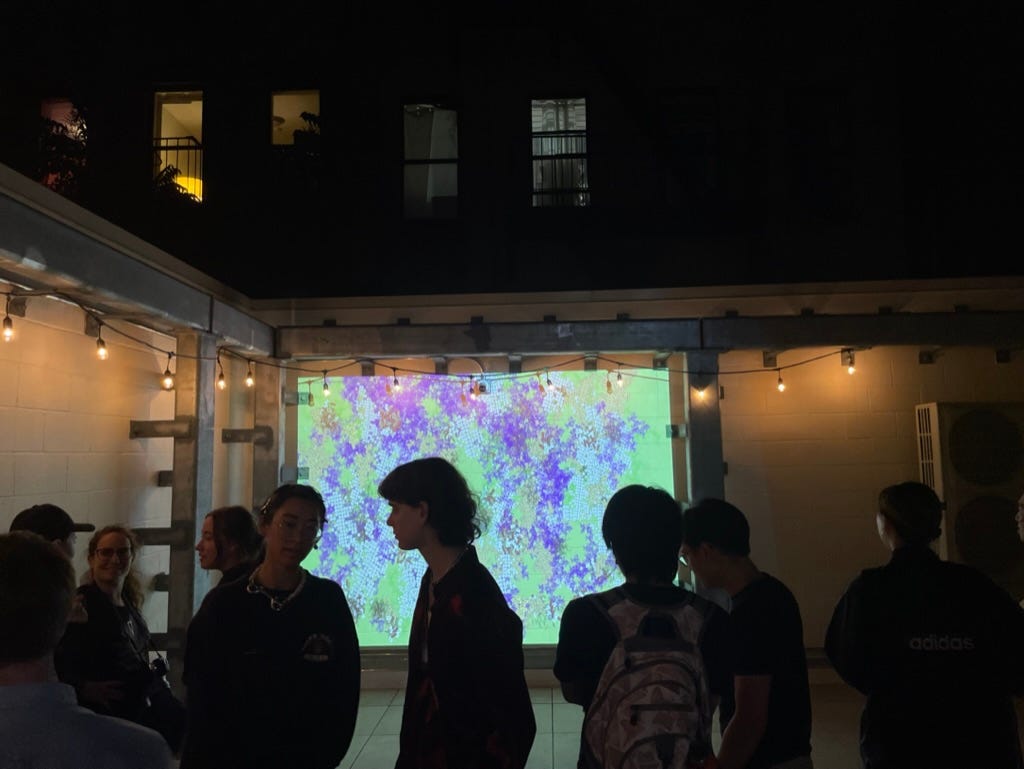[TI-04] gestures at alternative internets
if we are to hallucinate, let us choose the kind of vision we picture
Yesterday, a website of mine, html garden, was installed on an outdoor patio for a live event. I wasn't there in person but received pictures of people using it as a backdrop for their photos or simply standing in front and watching it move. While I don't make websites for the purpose of being displayed in real life—I make websites as a desperate act to create intimate gathering spaces, one that internet natives might find and sit for a while—it feels like a different kind of meaning to see the pixels and bits you crafted translated into a site of communion, contemplation, and wonder.
I've been thinking about how to weave my art practice into my research and engineering practice. I've been talking to friends in similar positions about their approaches to get a better idea. A talks of smooshing them all together into one giant blob that is her. C feels that nothing should be compromised, that you should embrace every single identity you feel compelled by and live every moment fully seated in them. I've been visualizing it as weaving different braids for each, adopting new knots that fit, and learning to interweave them in a single quilted strand: interdependent yet whole in themselves.
My entire research and art practice involves creating technology (tools, public infrastructure, instruction manuals) and internet sites (places, dinner parties, neighborhood libraries) that highlight the humanity shining in every seam of the computers we use and the materiality of these invisible bits and pixels. I want to subvert the overwhelming understanding of technology as an oppressive force pushed by large technology platforms and apps that feed on our attention to survive. I want to create space for real dialogue between the human and the computer, where computing is a medium for people to express themselves, cherish others, and create the possibility for imaginative change. I want to make computers feel like feelings, as Tim Hwang and Omar Rizwan claim: "For us, computer is the specific feeling of artifacts that allow for intimate systems of personal meaning."

With any speculative research, I have found that I need to create these "art" pieces to gesture towards the kind of world / vision / thing that I am grasping at and fumbling towards. What is takes to get there still feels very hazy, but each time I create something that is "out there," that questions and then shows "what-if", it bursts a clearing of possibility in the haze (I'm reminded of Minesweeper when you're stuck and take a gamble by clicking in unsolved space, hoping to find a clearing). I believe this kind of gesturing and speculating is essential to understanding what is really needed at the infrastructural level to produce the environment for these feelings.

html garden is a garden of digital-native plants (different species composed of different HTML elements) that grow every day. On a new day, you might find new saplings or a new branch on the plant you were admiring previously. By creating space for these changes and acts of noticing, I seek to give agency to visitors to witness the passage of time and be rewarded for doing so. The garden itself also functions as a rooted gathering space, one where people may share experiences and moments in the constant transformation of the website.
https://twitter.com/spencerc99/status/1643410142963335168
With "html garden," I sought to create an internet place with a real-world environment. I wanted to create a "seasonal" website, one that not only changes with the seasons but also grows noticeably day-to-day. On the internet, we often seesaw between extreme permanence (deleted content getting dug up through the endless archives) and extreme ephemerality (official research and information disappeared by link rot and entire worlds shut down by company acquisitions). I think a lot of our tension with computers and the internet is that they tend to turn everything into a binary. We are whiplashed between extreme ends, often experiencing a contradictory reality caught between both realities simultaneously.
In the physical world, things move in gradients and naturally transition between states. "Permanent" artifacts are preserved (note that this is an active action), like family artifacts and stories. There's a lineage to the permanence of an object or a place. Homes can disappear and neighborhoods can change, but they happen over the course of days and weeks and years. These aspects still apply to computing objects, but the work involved is invisible and hard to understand. As modern technology improves maybe changing the physical world will become as fast as changing the digital one, but for now, only in the digital, does it feel like, at any moment, everything you know and love could seemingly disappear from your eyes. Being on the internet feels more like a collective hallucination than anything real or material.
So when I make internet sites to sit in this in-between, I am really painting a different kind of hallucination, one in which technology highlights the motions of the people around you who you're never able to notice, one that offers you markers to reference growth, decay, and change and acknowledges your radical act of close attention in a space that has never prized the quality of attention, only the quantity of it.
This is but one gesture toward an incomplete picture. I would love to hear about the gestures you've made or seen that have helped you burst into a new possibility space of thinking around what the internet and computers can or should be. Please email or message me!
Here are some pieces that I've come across lately that rhyme..
The Computer is a Feeling by Tim Hwang and Omar Rizwan
The Creation Myths of Computing by Chia Amisola
on wasting time by L. M. Sacasas




